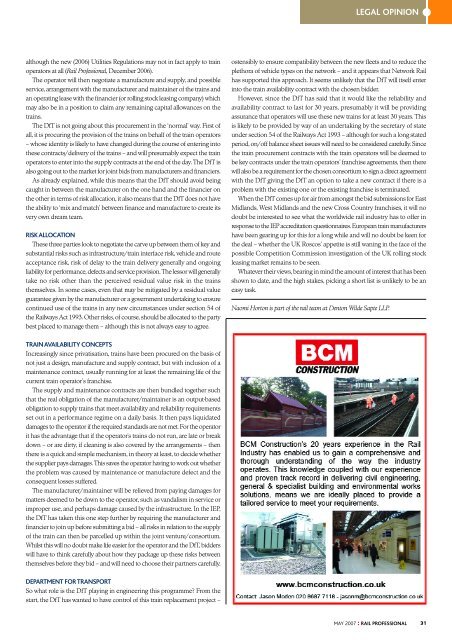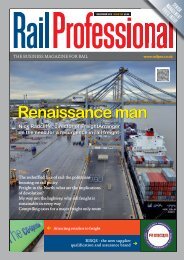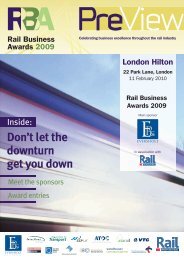move over freightliner, we want to get into ... - Rail Professional
move over freightliner, we want to get into ... - Rail Professional
move over freightliner, we want to get into ... - Rail Professional
Create successful ePaper yourself
Turn your PDF publications into a flip-book with our unique Google optimized e-Paper software.
LEGAL OPINION<br />
although the new (2006) Utilities Regulations may not in fact apply <strong>to</strong> train<br />
opera<strong>to</strong>rs at all (<strong>Rail</strong> <strong>Professional</strong>, December 2006).<br />
The opera<strong>to</strong>r will then negotiate a manufacture and supply, and possible<br />
service, arrangement with the manufacturer and maintainer of the trains and<br />
an operating lease with the financier (or rolling s<strong>to</strong>ck leasing company) which<br />
may also be in a position <strong>to</strong> claim any remaining capital allowances on the<br />
trains.<br />
The DfT is not going about this procurement in the ‘normal’ way. First of<br />
all, it is procuring the provision of the trains on behalf of the train opera<strong>to</strong>rs<br />
– whose identity is likely <strong>to</strong> have changed during the course of entering in<strong>to</strong><br />
these contracts/delivery of the trains – and will presumably expect the train<br />
opera<strong>to</strong>rs <strong>to</strong> enter in<strong>to</strong> the supply contracts at the end of the day. The DfT is<br />
also going out <strong>to</strong> the market for joint bids from manufacturers and financiers.<br />
As already explained, while this means that the DfT should avoid being<br />
caught in bet<strong>we</strong>en the manufacturer on the one hand and the financier on<br />
the other in terms of risk allocation, it also means that the DfT does not have<br />
the ability <strong>to</strong> ‘mix and match’ bet<strong>we</strong>en finance and manufacture <strong>to</strong> create its<br />
very own dream team.<br />
RISK ALLOCATION<br />
These three parties look <strong>to</strong> negotiate the carve up bet<strong>we</strong>en them of key and<br />
substantial risks such as infrastructure/train interface risk, vehicle and route<br />
acceptance risk, risk of delay <strong>to</strong> the train delivery generally and ongoing<br />
liability for performance, defects and service provision. The lessor will generally<br />
take no risk other than the perceived residual value risk in the trains<br />
themselves. In some cases, even that may be mitigated by a residual value<br />
guarantee given by the manufacturer or a g<strong>over</strong>nment undertaking <strong>to</strong> ensure<br />
continued use of the trains in any new circumstances under section 54 of<br />
the <strong>Rail</strong>ways Act 1993. Other risks, of course, should be allocated <strong>to</strong> the party<br />
best placed <strong>to</strong> manage them – although this is not always easy <strong>to</strong> agree.<br />
ostensibly <strong>to</strong> ensure compatibility bet<strong>we</strong>en the new fleets and <strong>to</strong> reduce the<br />
plethora of vehicle types on the network – and it appears that Network <strong>Rail</strong><br />
has supported this approach. It seems unlikely that the DfT will itself enter<br />
in<strong>to</strong> the train availability contract with the chosen bidder.<br />
Ho<strong>we</strong>ver, since the DfT has said that it would like the reliability and<br />
availability contract <strong>to</strong> last for 30 years, presumably it will be providing<br />
assurance that opera<strong>to</strong>rs will use these new trains for at least 30 years. This<br />
is likely <strong>to</strong> be provided by way of an undertaking by the secretary of state<br />
under section 54 of the <strong>Rail</strong>ways Act 1993 – although for such a long stated<br />
period, on/off balance sheet issues will need <strong>to</strong> be considered carefully. Since<br />
the train procurement contracts with the train opera<strong>to</strong>rs will be deemed <strong>to</strong><br />
be key contracts under the train opera<strong>to</strong>rs’ franchise agreements, then there<br />
will also be a requirement for the chosen consortium <strong>to</strong> sign a direct agreement<br />
with the DfT giving the DfT an option <strong>to</strong> take a new contract if there is a<br />
problem with the existing one or the existing franchise is terminated.<br />
When the DfT comes up for air from amongst the bid submissions for East<br />
Midlands, West Midlands and the new Cross Country franchises, it will no<br />
doubt be interested <strong>to</strong> see what the worldwide rail industry has <strong>to</strong> offer in<br />
response <strong>to</strong> the IEP accreditation questionnaires. European train manufacturers<br />
have been gearing up for this for a long while and will no doubt be keen for<br />
the deal – whether the UK Roscos’ appetite is still waning in the face of the<br />
possible Competition Commission investigation of the UK rolling s<strong>to</strong>ck<br />
leasing market remains <strong>to</strong> be seen.<br />
Whatever their views, bearing in mind the amount of interest that has been<br />
shown <strong>to</strong> date, and the high stakes, picking a short list is unlikely <strong>to</strong> be an<br />
easy task.<br />
Naomi Hor<strong>to</strong>n is part of the rail team at Den<strong>to</strong>n Wilde Sapte LLP.<br />
TRAIN AVAILABILITY CONCEPTS<br />
Increasingly since privatisation, trains have been procured on the basis of<br />
not just a design, manufacture and supply contract, but with inclusion of a<br />
maintenance contract, usually running for at least the remaining life of the<br />
current train opera<strong>to</strong>r’s franchise.<br />
The supply and maintenance contracts are then bundled <strong>to</strong><strong>get</strong>her such<br />
that the real obligation of the manufacturer/maintainer is an output-based<br />
obligation <strong>to</strong> supply trains that meet availability and reliability requirements<br />
set out in a performance regime on a daily basis. It then pays liquidated<br />
damages <strong>to</strong> the opera<strong>to</strong>r if the required standards are not met. For the opera<strong>to</strong>r<br />
it has the advantage that if the opera<strong>to</strong>r's trains do not run, are late or break<br />
down – or are dirty, if cleaning is also c<strong>over</strong>ed by the arrangements – then<br />
there is a quick and simple mechanism, in theory at least, <strong>to</strong> decide whether<br />
the supplier pays damages. This saves the opera<strong>to</strong>r having <strong>to</strong> work out whether<br />
the problem was caused by maintenance or manufacture defect and the<br />
consequent losses suffered.<br />
The manufacturer/maintainer will be relieved from paying damages for<br />
matters deemed <strong>to</strong> be down <strong>to</strong> the opera<strong>to</strong>r, such as vandalism in service or<br />
improper use, and perhaps damage caused by the infrastructure. In the IEP,<br />
the DfT has taken this one step further by requiring the manufacturer and<br />
financier <strong>to</strong> join up before submitting a bid – all risks in relation <strong>to</strong> the supply<br />
of the train can then be parcelled up within the joint venture/consortium.<br />
Whilst this will no doubt make life easier for the opera<strong>to</strong>r and the DfT, bidders<br />
will have <strong>to</strong> think carefully about how they package up these risks bet<strong>we</strong>en<br />
themselves before they bid – and will need <strong>to</strong> choose their partners carefully.<br />
DEPARTMENT FOR TRANSPORT<br />
So what role is the DfT playing in engineering this programme? From the<br />
start, the DfT has <strong>want</strong>ed <strong>to</strong> have control of this train replacement project –<br />
MAY 2007 : RAIL PROFESSIONAL<br />
31

















